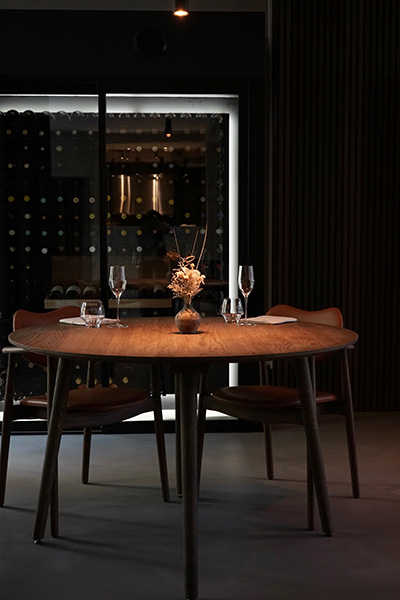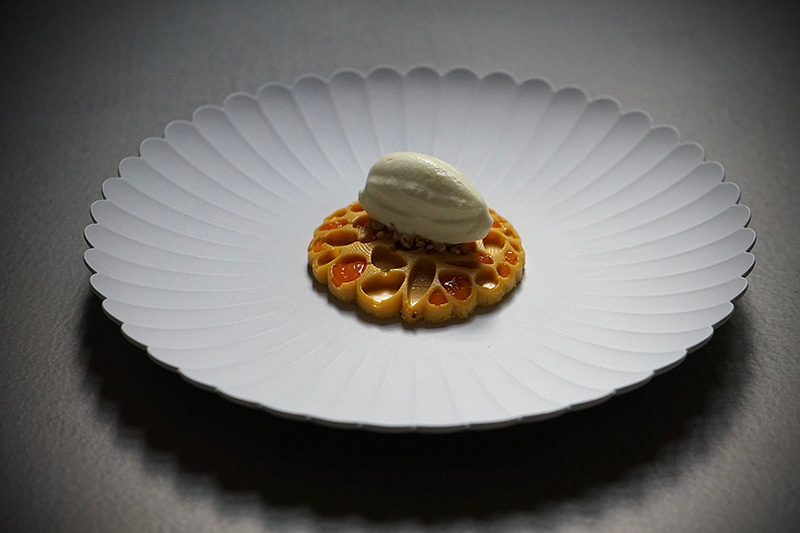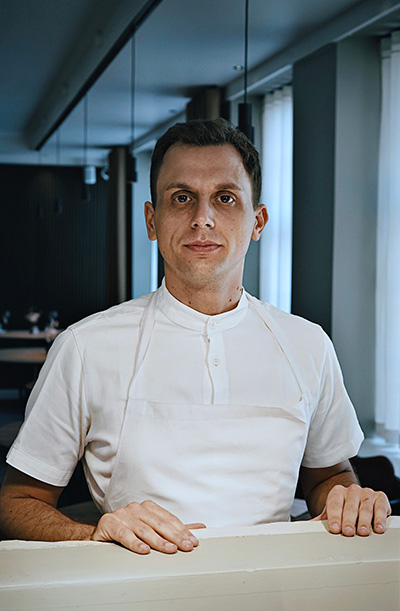
Growing up in Northern Italy, in a town called Malonno in the Lombardy region. From the age of 14 Nicola spent his summers working in restaurant kitchens and at the age of 18 was working at two Michelin starred restaurant Miramonti l’Altro in northern Italy. In 2011 he was researching different approaches to food and decided that the New Nordic approach was one that fit his overall ethos; he moved to Copenhagen and worked at Era Ora, Noma and Quadri before opening Brace.
A pioneer of Nordic-Italian cuisine, Nicola Fanetti’s dishes take a minimalistic approach in celebrating bold flavours. Menus change eight times a year, per each micro season to ensure produce is used at its absolute best. Nicola blends his Italian roots seamlessly with Nordic sensibilities and ingredients.
Nicola places a strong importance on sustainability, ensuring each and every part of an ingredient is utilised where possible and is constantly striving to improve in reducing the waste and mileage of every dish. Uniforms are made from recycled tablecloths, staff are given handbooks on sustainability at the restaurant and at home. This approach was rewarded in 2021, when Brace was awarded a Green Star by the Michelin Guide for their work at the forefront of the industry when it comes to sustainable practices.
The idea of continuing to push boundaries and collaborative inspiration is what drives Nicola. The pursuit of creating food and a business that is kind to the environment and reflective of the people involved is at the heart of his cooking.
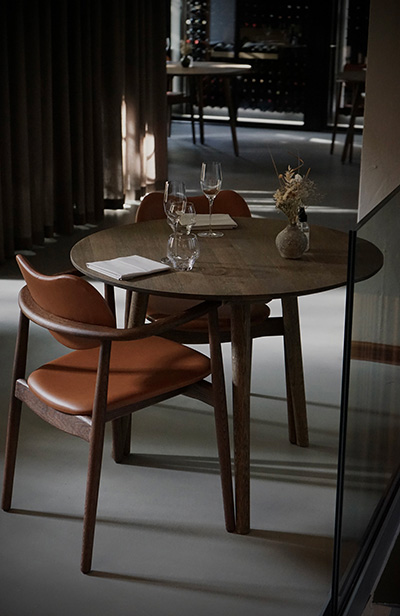
What is the biggest challenge facing your restaurant now?
It was a historical period in which, as a chef and an entrepreneur, I asked myself many questions about my business and the future of my restaurant. After more than a year marked by COVID-19, it was not easy to understand how we could move forward. Above all, how could we make it back to where we once were? The biggest challenge I have ever faced was to relaunch the restaurant again. To relaunch and reopen as a commercial activity and a restaurant that welcomes its guests after a long absence. We would all have to work as a team, becoming a family. This was one of the most significant challenges. A struggling economy can be fixed, but I had to unify my team, rebuilding that solid and loyal brigade Brace is known for, which we did together.
Is there anything that you would do over again if you had the chance?
When I think about my private life, I don’t think I would change anything from my past. I think back to the birth of my daughter, and it is something that completes me and amuses me at the same time. Time spent with her brings me back down to earth and positions me in a healthy reality. She is my driving force.
From a business perspective, I think I would practically do everything over again. There were ups-and-downs, as in any business, but everything I experienced has led me to where I am today. And there were many lessons learnt along the way. Maybe I would be more self-aware. If I could go back in time, then I think that I would not take things so seriously. To the Nicola of 10 years ago, I would say: have belief in yourself, you are on the right path, and do not be afraid of making the big decisions.
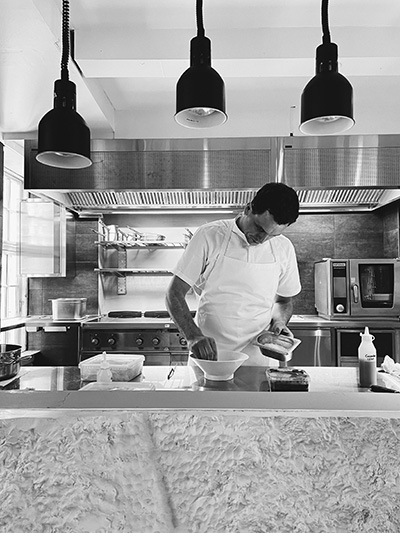
Tell us about your experience at culinary school and the credentials your earned through your culinary studies.
All my studies have been oriented to my current profession. I first attended a cooking school when I was a teenager, and then I deepened my studies by practising a higher education course at ALMA in Colorno (Parma). Here, I gained my knowledge of the history of the Italian gastronomic culture, concerning food, haute patisserie, and oenology. Each of these theoretical studies was then transformed into a practical approach, thanks to the guidance of great chefs. I was a good student and eager to learn, educating myself in the culture and traditions of Italian gastronomy. I began to understand the theoretical study of ingredients, techniques and origins of a culinary tradition and how they are the basis of every thought and creation.
What do you do to stay current on new trends? Describe two or three of the most interesting industry trends.
To keep up to date, I buy and read many sector books.
I like to use the old method of reading recipes by leafing through pages and looking at the images.
At the same time, we live in an age where you have the opportunity to enter the life and restaurants of others, without getting on a flight and going to the other side of the world. Unfortunately, I have little time to travel. However, social media allows me to keep up to date on new trends and gastronomic evolutions.
Currently, I have noticed that luxurious ingredients such as truffles and caviar are taking up more and more space in kitchens outside of France and Italy. Another orientation of the moment is towards the vegetable. More and more attention is being paid to forms of nutrition in which fruits and vegetables manage to be the protagonist of a Tasting Menu, almost pulling the attention away from meat and fish. Furthermore, this new approach reflects sustainability and shows respect for the environment. It is no longer a question of just cooking but sending a message.
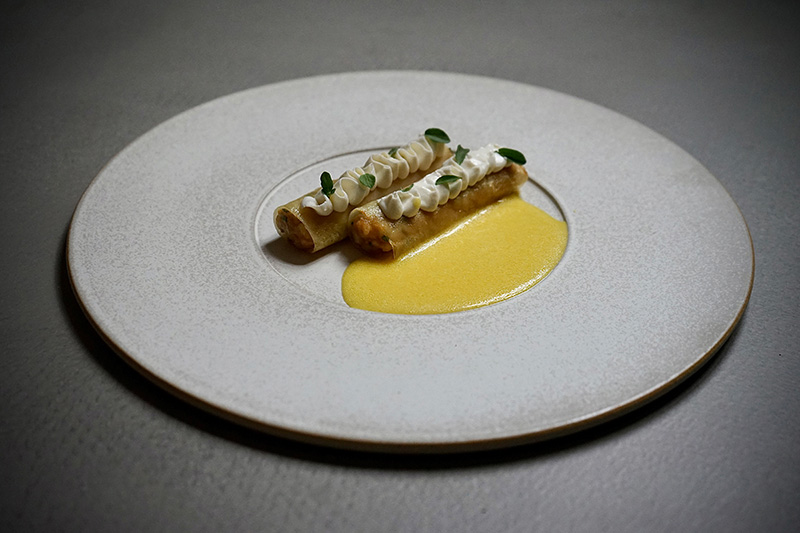
How do you test the quality of your ingredients?
Before a menu change, I identify new small local suppliers. I always try to take the time to visit the farms in the area. It is vital to meet the producers and understand the earth and sea and where the produce comes from. I do the shopping myself every day, and our suppliers also visit the restaurant so that my team and I can meet them and study the ingredients up-close. This isn’t about control or trust, but human relationships and building a bond between farm and table. It is also important that my team see and feel a product, learning to distinguish the difference between what is good and bad and how to properly handle and respect an ingredient.
What is your favourite thing about being a chef?
What I appreciate most about this work is the continuous evolution necessary to grow. We tend to study and deepen themes and techniques with a natural propensity that almost does not exist in other professions. We can then solve problems and inconveniences, especially when those problems occur in a moment of high pressure, such as during service. In this era, I also believe that being a chef means being the spokesperson for strong messages. Today, a chef is a messenger for change, using their platform to better the planet, and we can start with food.
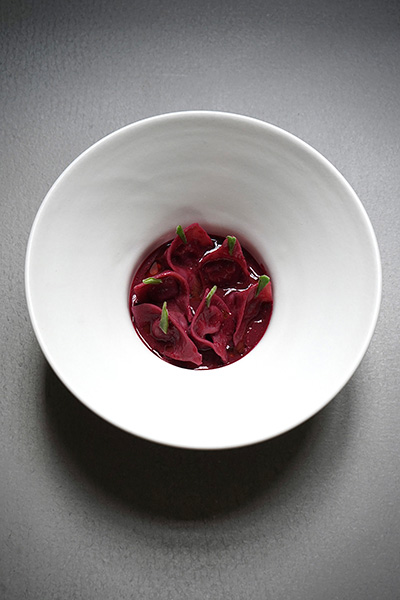
Unlike many other chefs, you started cooking out of necessity and not out of passion. Can you elaborate?
My parents were always busy at work, which meant never having time to cook and enjoy lunch or dinner together around the table. I grew up with my grandparents, who, unlike my parents, taught me how to collect vegetables and herbs from their farm and how to cook them afterwards. It all started out of necessity. I tried to replicate the dishes I ate with my grandparents and the ones I enjoyed the best. I brought them to the table and made sure that everyone ate a hot meal without worrying about work. It was a healthy distraction that made me proud, and I became obsessed with farming, growing, harvesting and how best to apply those ingredients.
I then decided to commit and pursue my passion for cooking.
How were Chef Redzepi and Chef Puglisi an inspiration to you?
Both chefs allowed me to discover a new gastronomic culture not known to me before. I met them through a magazine that talked about the new Nordic cuisine and everything deriving from it. I was fascinated by a new world, one close to the one I was from, growing up in the wood of Northern Italy. Working at Noma, I resumed a series of habits I had learned from my grandparents, and therefore I had the urge to go back to my origins. On the other hand, Puglisi strongly inspired me to approach vegetables differently, treat them with great respect, and use them as the central ingredient to a dish. A vegetable does not have to play second-string to a piece of meat or fish, and today, vegetables are an integral part of my menus.
What’s your advice for aspiring chefs?
The advice I always give to my team is to never overdo the experience. I am of the idea that it is necessary to learn and work hard, but at the same time, I believe that having many experiences just to fill a curriculum can contaminate the essence and attitude of a person too much.
Time must be invested in the right way. This is especially important when you are talking about cooking and service. In fact, the more experiences you accumulate over time, the more you want to become a replicator of what others have done, but you can tweak lessons along the way so that it is correct and works for you.
